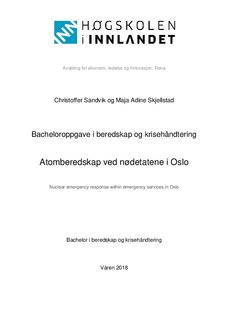Atomberedskap ved nødetatene i Oslo
Bachelor thesis
Permanent lenke
http://hdl.handle.net/11250/2580699Utgivelsesdato
2018Metadata
Vis full innførselSammendrag
Dette prosjektet har til hensikt å se på hvordan nødetatene i Oslo jobber opp mot et scenario som omhandler et atomangrep. Vi har sett på hvilket fokus det er på atomberedskap blant nødetatene i Oslo i dag, og om det forventes eller planlegges endringer på området i tiden som kommer. En stor utfordring med dette prosjektet har vært å få informanter til å stille på intervjuer. Det at en av nødetatene valgte å ikke stille har i seg selv vært et interessant funn for oss i forhold til problemstillingen. Vi startet prosjektet med et fokus på hvor mye nødetatene prioriterer arbeidet med atomberedskap, og et eventuelt angrep med kjernefysiske våpen. I løpet av tiden vi har arbeidet med dette prosjektet har vi fått en forståelse for det arbeidet som gjøres i dag i forhold til atomberedskap, hvor lite det prioriteres og hva som kan være årsakene til det. Vi har valgt kvalitativ metode for å gjennomføre prosjektet, og har benyttet oss av dybdeintervjuer, samt grounded theory. Grounded theory er best egnet for åpne og undersøkende problemstillinger, og fordrer at en ikke benytter seg av eksisterende teori for å finne en god problemstilling. Vi gikk inn i prosjektet med en åpen og undersøkende problemstilling, samt en eksplorativ tilnærming, og lot teorien komme til underveis i prosjektet. Intervjuene gav oss innsikt i hvordan nødetatene i Oslo prioriterer atomberedskap i dag, og hvilke tanker de har rundt dette beredskapsfeltet. Datamaterialet ble analysert underveis i innsamlingsprosessen, og etter siste fase i kodingen endte vi opp med de fem hovedkategoriene; samvirke, øving og trening, kommunikasjon, kompetanse og prioritet. Vi utredet disse kategoriene i forhold til vår problemstilling, og sammenlignet vår innsamlede empiri med eksisterende teori. Av prosjektet kan vi se det er et tydelig samsvar mellom empiri og eksisterende teori, og vi fikk bekreftet hvilken betydning samvirke, øving og trening, kommunikasjon og kompetanse har for nødetatenes arbeid med atomberedskap. Flere av våre funn viser hvor viktig disse elementene er for å kunne håndtere et scenario med bruk av kjernefysiske våpen. En kan se av empirien at våre hovedkategorier har stor betydning for det arbeidet nødetatene gjør i dag, men at fokuset ikke ligger på atomberedskap. Men i arbeidet med å bedre atomberedskapen har myndighetene innført et syvende scenario. I dette ligger det nettopp at det skal utarbeides planer for et atomangrep. Vi ser derfor at fokuset kan være i ferd med å endre seg. Engelsk sammendrag (abstract)
This thesis examines how the emergency services in Oslo work to prepare themselves for the event of a nuclear attack. In particular, we investigated the current focus of the emergency services with regards to a nuclear event, and whether this focus is likely to change in the near future. One of the challenges with this project was finding informants. Our research was further complicated by the fact that the police refused to participate, which in itself was an interesting insight for us with regards to our problem case. We started this project by focusing on how the emergency services prioritise nuclear preparedness, and a possible attack with nuclear weapons. During this project, we learned about the work that is done today when it comes to nuclear preparedness, how little priority it is given, and the possible reasons for this. We followed a qualitative approach for this project, which involved in-depth interviews and grounded theory. Grounded theory is most suitable for open and investigative problem cases, and requires that one does not employ existing theory to make a good problem case. Accordingly, we chose to start this project openly, with an investigative problem case and explorative approach, which means that we found the theory later on in the project. The interviews with our informants gave us an insight into the way in which the emergency services prioritise nuclear preparedness today, and the thought and decision making processes they have when it comes to these preparations. The data we collected was analysed upon collection, and following the final stage of the coding we decided upon five main categories: interaction, rehearsal and training, communication, competence, and priority. We compared these categories against our problem case, and also our collected data against existing theory. Through this project, we can see a clear correlation between the data we collected and existing theory. This confirmed to us the importance of interaction, rehearsal and training, communication and competence with regards to the work of the emergency services and their work with nuclear preparedness. We have several findings that show how important these elements are to be able to deal with a scenario that include nuclear weapons. Our empirical data shows that while our main categories outlined above have great importance for the work of the emergency services, their focus on nuclear preparedness is not that great. But in the efforts to improve nuclear preparedness, the authorities have introduced a seventh scenario. This scenario concerns planning and preparation for a nuclear attack. Based on that, we see that the focus may be changing.
Beskrivelse
Bacheloroppgave i beredskap og krisehåndtering
